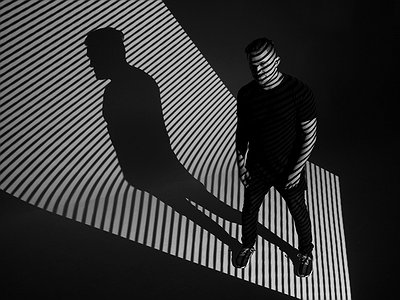Name: Vitaliy Babiy
Nationality: Ukrainian
Occupation: DJ/Producer, label founder of Codex Recordings and IAMT
Current Release: Elements via Codex Recordings
Recommendations: John Seabrook: Nobrow: The Culture of Marketing, the Marketing of Culture
Actually, it was a friend of mine who recommended this book to me. I remember we were discussing the literature that could somehow give me more insight into what is happening. It’s an interesting work but at the same time rather subjective, I would say. It’s a good read by John Seabrook who stood at the roots of this culture while working as a columnist for New Yorker, Vanity Fair, and Vogue. He expresses his personal point of view on the developments he observes but it’s still really interesting how he shows how this culture has been reborn, and how marketing has started playing the first fiddle in culture. So that’s the piece I recommend if you want to look at some things from a different angle, which is a very important thing for many of us.
Sasha – Invol2ver
Another thing I’d like to recommend is an album titled Invol2ver by Sasha. It’s been in my playlist for about ten years now. It’s an amazing album where almost every track is Sasha’s own vision. To me personally, this album has never become old. Great work, indeed, and I really love listening to this music during my flights, in traffic jams, when I travel with my family, or when I simply need a reboot. It’s hard for me to explain why this exact album got me so much but if you haven’t listened to it yet, you should check it out and feel its depth. You will hear how hard Sasha worked compiling and mixing these tracks and how great all those artists were who took part in the project.
Website / Contact: If you enjoyed this interview with Spartaque, visit his website, youtube channel or facebook profile for further information and more music.
When did you start writing/producing music - and what or who were your early passions and influences? What is it about music and/or sound that drew you to it?
I started writing music quite a long time ago. I believe this happened even before I decided to become a DJ. Actually, throughout my musical career, producing music has always been my top priority. If I’m not mistaken, I made my first tracks when I was about 13-14 years old. I used some primitive software. I would borrow a PlayStation from my friends. It had a CD to it called Music 2000. That software allowed me to write my first tracks. Back in the day I was really into break dance and I also loved electro funk. This music is just designed for break dancing, with all that breakbeat. Then Breaks came into my life, so I liked that one, too. I also recall funk, I remember myself watching Battle of the Year on VHS again and again … Those were Break Dance world championships. All those breakbeats attracted me a lot. So my first tracks, or to be more precise, whole albums, were filled with tracks written in electro funk breaks.
For most artists, originality is first preceded by a phase of learning and, often, emulating others. What was this like for you? How would you describe your own development as an artist and the transition towards your own voice? What is the relationship between copying, learning and your own creativity?
The moment when I was first learning to produce music was a long time ago, some 15 years have passed, I believe. But I still keep learning something new and there are plenty of things I’m sure I haven’t mastered yet. So I believe writing music is an unstoppable process and in 10 years from now, I’ll still be saying that I keep learning. But of course, in the very beginning, the process was much more creative. That’s because I wasn’t dragged down by knowledge, as they say. I was more engaged with the very idea of tracks than the quality of sound. Obviously enough, the first speakers I used were some of the unsophisticated 5.1 format, and my headphones were also cheap and simple. Of course, I had no opportunity to exploit to the maximum those reference tracks I was focused on, so it was a super-creative process on my part as I didn’t waste my time dealing with mechanics, I was just totally into my ideas and writing my own tracks.
As for the connection between learning, emulating someone’s work and my own creativity, I believe the three elements are inseparable in a way. Very often, when I start writing something new, I am inspired by some podcasts, radio shows or certain works that have just been released. Of course, being an artist, a DJ and a person who should channel to masses a certain generalized cultural code instead of just playing own tracks, I follow very closely the latest developments on the music market and I then try to reflect this all in my production. So, in general, these processes are really interconnected and remain very important for my work.
What were your main compositional- and production-challenges in the beginning and how have they changed over time?
Probably, the initial challenges I faced were related to the lack of skills in creating certain sounds, achieving certain sound effects, including vocoder or sidechain and other features unknown to me back in the day. It was that difficult to me at that time because in the city I was growing up in, there was no one who would write that music, so I was a kind of a black sheep, I guess. None of my friends were into that stuff. They would all say I’m some kind of whacko … As for the challenges that emerged later, when I started growing up as an artist, performing and touring, I realized that I had some real big problems with my sound quality. Even today, now that I have done a ton of releases on many great labels already, I’m still not sure that I have that perfect sound I seek. I always look forward to learn more, listen closely to advice, and look for new approaches. Today, new mechanical features are what I’d like to continue studying in order to further perfect the music I make. Once again, I can say that being too engaged with sound perfection distracts me from the creative process a lot. Sometimes, I bluntly divide my studio work on sessions when I write music and develop some idea of mine, and the sessions when I work on sound quality. Then it works well.
What was your first studio like? How and for what reasons has your set-up evolved over the years and what are currently some of the most important pieces of gear for you?
The first thing I acquired for my studio were KRK RP monitors which changed the way I wrote music fundamentally and my whole attitude to the process. Of course, they added quality to my tracks but they definitely made the creative process more sophisticated, too. As I said, I started to focus more on the sound and less attention was paid to the creative process. So that dragged me down a lot because at times I would add a certain sound, and then you don’t like it and try to change everything, and so on … So yeah, later I upgraded my KRK 6Ps, then there were Adam A7, now I have Focal.
Among all studio equipment, the most important gear for me are monitors. Also important is the room which needs to be designed in the right way. There is also my RME Fireface soundcard which is crucial and which I love. I also love my midi keyboard Korg Control 49. A real quality piece which I definitely enjoy using. As for keyboards, I prefer virtual synths simply because of my tight touring schedule and the fact that I spend a huge amount of time during weekdays on management issues. So the only time I have to create music is during my days off, when I’m on a plane flying somewhere or at a hotel … Maybe it’s a sad thing to note or maybe it’s not, but in fact, the place where I write most of my music is onboard a plane. So mobility is my top priority in my music production.
How do you make use of technology? In terms of the feedback mechanism between technology and creativity, what do humans excel at, what do machines excel at?
In general, I am a real technology maniac. I always follow the latest trends and I try to have at my disposal the latest pieces of gear in terms of personal electronic devices, including my notebook and smartphone. Of course, I really love various fresh products on the market of musical electronics, I adore the new Pioneer Toraiz sequencer which I acquired just recently into my collection of electronic devices. But still, in terms of anyone’s creative process, I would not recommend relying fully on electronics except on LFO and automation. It’s certainly about human control at the end of the day. So I can say that I am more of a conservative guy in this respect. I trust myself more than I trust any machines, no matter how sophisticated and hi-end they are.




